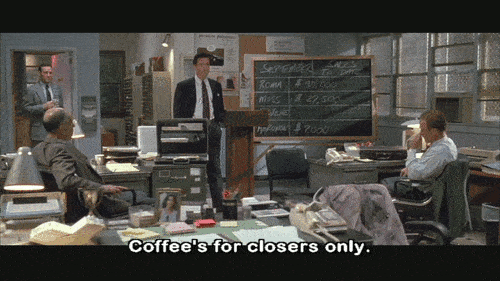Is Coffee Still for Closers? The Evolution of Sales Relationships

Is it true what Alec Baldwin’s character, Blake, in 1992’s Glengarry Glen Ross told us? Should we always be closing, and is coffee only for closers? Is it more important to value the bottom line over your sales relationships?
The short answer is “no.” The methodology of outbound sales in this digital world has changed drastically in the 25 years since this film’s debut. It’s no longer about that single sale — the lifetime value of your customer is what counts.
It’s fantastic to pick up the phone and get a sale immediately, but the world is now a busier place. So you need to be ready to speak to multiple people, form many relationships, and being a resource rather than just a contact.
Why have things changed?
While the blanket answer of “the internet” isn’t wrong, it’s not completely right, either. While it likely was spurred on by the internet, the largest change that’s occurred in sales (and business as a whole) is the prioritization of services over products. Rarely do B2B companies sell a single product where one transaction with a credit card is the first and only step. Instead, sales representatives are selling subscription packages (SaaS, PaaS, etc.), or service contracts.
By selling services, sales representatives have found that product knowledge is no longer their most valuable asset. Instead, their most valuable asset is their customer knowledge. Sales representatives need to understand the industry or industries they’re targeting, the pain points of their customers, what their product does to solve those problems, and how the solution will benefit the customer’s business. After all, ease-of-use no longer makes a great sales pitch. Reps need to promise results. Customers are in search of better insights, security, lower operating costs, more profit, shorter workflows, and scalability.
How do you learn about your customer?
Knowing your customer can only happen after you fully know your product. Ask yourself: “What problem does this solve?” “Which pain points cause the biggest problems?” “Does this make the most sense for a particular industry or department?” Now, based on the answers to these questions, ask yourself “What job titles would the person buying my product have?”
At this point, it’s time to get to work and create your buyer personas. For additional help crafting your buyer personas, use our buyer personas template.
But the most important part of creating these personas is talking with your customers. Never assume you have all the answers or you know exactly what their problem is. You might find yourself surprised after you actually talk to you customers.
Constantly challenge yourself to find new pain points that your solution solves. Since products, competition, and industries will inevitably change, this is not a static exercise. Your buyers will most likely evolve over time. So instead of continuously using stale pain points, revisit your buyer personas regularly and question whether or not they are still relevant. Even if your buyers don’t change right away, you could find interesting new ways to market yourselves.
Building sales relationships
Sales relationships aren’t just about what you can do for the customer. It needs to be personal and based on trust. You can build trust by adopting a few effective habits.
Respond within a day
Whether it’s a phone call or email, make time for the prospect who is seeking your help. Don’t sit on emails, and don’t let your voicemail inbox get crowded with customer requests. Pick a time every day to check your email, check your voicemail, and respond to those individuals who need your time. You’ll stick out in their minds for responding to their questions quickly.
Make it a conversation
A good conversation happens when both parties ask plenty of questions, and both listen intently.
On your first sales call with your customer, it’s okay to have a sales pitch ready-to-go or a lead-in question. But if it doesn’t feel right, lose it. After all, you don’t want to sound like you’re reading from a script. No one likes being read to.
Each customer is unique. See where the conversation takes you, and make sure you’re still talking about your business by the end of it.
If a customer starts talking about a problem that your product doesn’t directly solve, find a creative way back to your solution. Comment on that problem, though. Don’t ignore it. If a customer is sharing a problem with you, there’s a reason. And it’s your job to listen closely. Additionally, if your company has partner solutions that might interest your customer, use those to your advantage. Take note of the problem the customer is experiencing, and reach out after you’ve closed the deal. They’ll appreciate that you found a way to solve their HR problem even though your company sells IT services.
Use that first call as introduction of not just your company, but of you, the person. Leave the customer with something memorable about you or your business, so when you call back a second time they’re more receptive to your offering.
Engage socially
The internet has changed a lot of things, and that includes how you stay connected with customers over time. Even after they close, it’s important to maintain those social relationships on sites like LinkedIn.
Share worthwhile content from your company so it appears on the customer’s newsfeed. You can plug your company social pages, and point toward events you’re having. But it’s not all about business. This is a personal page, so share personal stories that are appropriate for a professional relationship.
So is coffee still for closers?
In 2017, coffee is for the sales relationship builders of the business world. It’s no longer about that final sale, it’s about setting meetings. It’s about education. And it’s all about constant connection.
DemandZEN provides B2B cold calling services across all industries. Reach out today for more information.
You Might Also Enjoy These Posts
B2B Appointment Setting Tips and Tricks that Always Work
How to Create an Exceptional Client Experience
Welcome To DemandZEN
DemandZEN specializes in Account-Based Demand Generation and solving the challenges around finding, engaging and converting target accounts into real opportunities for B2B Technology and Services companies.



